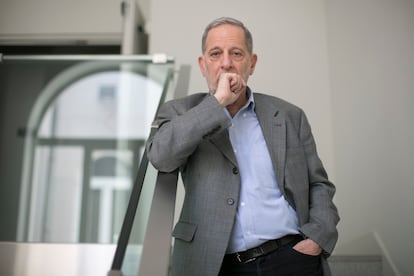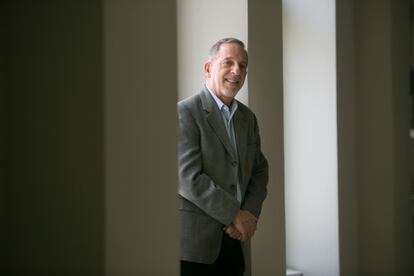Writer Rashid Khalidi: ‘As long as Israel starves and blocks Gaza, there will be violence’
The U.S. historian of Palestinian descent, who is an expert on the Middle East, believes the Palestinian Authority and Hamas have lost ‘credibility’ in the occupied territories and are no longer ‘engaged’ in the resistance movement

Rashid Khalidi was born in Manhattan in 1948. That year was the beginning of what the Palestinians know as Nakba — “the catastrophe” in Arabic — a term that refers to the mass expulsion of thousands of Palestinians to create the state of Israel. Khalidi, a U.S. writer of Palestinian descent and a historian specializing in the Middle East, believes that the catastrophe that shattered Palestine 75 years ago continues to this day. The historian — who wrote The Hundred Years’ War on Palestine: A History of Settler Colonialism and Resistance — agreed to chat in Madrid, just as the ceasefire between Israel and the Palestinian Islamic Jihad militia was taking effect. The ceasefire was reached after five days of clashes that have caused the death of more than 30 people, most of them civilians from the Gaza Strip.
Khalidi, who is the Edward Said Professor of Modern Arab Studies at Columbia University in New York, recounts in his book that back in 1899, his great-great-grandfather Yusuf Diya al Khalidi, then the mayor of Jerusalem, wrote to one of the fathers of Zionism, Theodor Herlz, to warn him that the Palestinians would not accept being pushed out. “In the name of God, leave Palestine alone,” he told him in a fiery letter. But none of that came to pass — except for Palestinians’ tenacity to resist.
Question. Do you believe the latest ceasefire agreement in Gaza will hold?
Answer. I’m very far away, obviously, and it’s hard to say, but yes, I think it may last. The Israelis think they’ve won. Islamic Jihad thinks it’s won. I think Hamas thinks that it was successful by not being involved. That may be a reason for a ceasefire lasting, but it won’t last for very long. As long as Israel is starving and blockading the Gaza Strip. As long as Israel refuses to allow connections between the Gaza Strip and the West Bank. And as long as the occupation continues, there’s going to be violence. The occupation breeds resistance.
Q. More than 30 people, most of them civilians, have been killed in Gaza during last week’s Israeli offensive against the Islamic Jihad militia. Do you foresee any consequences?
A. One of the consequences is a high degree of trauma for a population of more than two million people. I lived in Beirut during nine or 10 years of war from 1973 to 1983, and my children were affected by it. I can only imagine the effect on a population of 2 million, most of whom are children. It’s a very young population that will suffer lasting trauma. Only 100 homes were destroyed this time. Sometimes the Israelis destroy hundreds of homes, whole apartment buildings. In the wars that Israel wages against Gaza, hundreds and hundreds of people have been killed. Most of them are civilians. When the Israelis go into [the Palestinian city] Nablus and blow up a building, most of the people killed and wounded are always civilians. Sometimes they are after someone specific. They may kill that person, but they will kill others at the same time. That is the way that the Israeli army operates
Q. Despite the deaths of civilians in the last week in Gaza, Israeli Prime Minister Benjamin Netanyahu called it a “perfect operation.” What do you expect from this Netanyahu?
A. Every Israeli government since 2007 has attacked Gaza. This government is absolutely not different in any respect from previous governments. Israel has a policy. As if killing Palestinians every six months, every year, every whatever the period is in between, were normal and natural. They used to use an expression: “mowing the grass.” We have to “mow the grass” from time to time. The inhumanity of the expression tells you how blindly murderous this policy is. If the siege were lifted and if Israel negotiated with the Palestinians, with all of them, there would be a possibility of an alternative to this violence. But Israel has closed off any possibility of an alternative, of any negotiation. It doesn’t want to negotiate. It wants everything. It wants all the occupied territories to be absorbed into the greater land of Israel. And that has been the policy of governments, whether they were Likud governments or coalition governments or even when they were Labor governments. Settlement colonization never stopped. There are 750,000 illegal Israeli settlers, colonists in the occupied West Bank and Arab East Jerusalem. Every single government since 1967 has been settling Israelis.

Q. After the ceasefire with Israel, the political chief of Islamic Jihad, Mohamed al-Hindi, stated that the Palestinian resistance movement is “united.” Is it?
A. No. I would say two things. The first is that both the Palestinian Authority in the West Bank, supported by the United States, the EU, Israel and some Arab countries, and Hamas in Gaza, supported by Turkey and Qatar and Egypt — both of which have security arrangements with Israel — are not engaged in the resistance. They are, in fact, trying to limit resistance. So whatever Islamic Jihad says, that’s not true. The Palestinian Authority openly has security coordination with Israel. Hamas covertly has security coordination with Israel. It didn’t fire one rocket over the last of those five days. Clearly, they’re not united. The second thing I would say is that there is a spirit of resistance. There is a certain sense of unity in the West Bank and in Gaza. It is more of a grassroots thing than an organizational thing. It’s supported by groups like Islamic Jihad and supported from the outside, by Hezbollah, Iran, Syria. Networks like The Lion’s Den, which brings together people from different organizations. That’s something that neither the Palestinian Authority nor Hamas control.
Q. Do you share the feeling that Hamas and the Palestinian Authority have been absent from the latest escalations of violence with the Israeli army?
A. Yes, you may be right. Both have lost a certain amount of credibility. I think the Palestinian Authority has lost most of its credibility because it neither exists nor does it have a strategy for liberation. They are dependent on the United States and Israel and other donors. They have no visible diplomacy, no visible public outreach. They don’t speak to the world. They have nothing to say. They’re bankrupt. The leadership is made up of people who should have retired decades ago. And if there were elections, they would lose. In the case of Hamas, I think that they do provide a certain kind of stability, certainly for the middle classes. That’s true of both the Authority and Hamas. There are hundreds of thousands of people who work for both of these authorities, who depend on them for salaries, for mortgages. But that doesn’t affect most people in the occupied territories who are young, poor and don’t benefit. So I think they have been pushed to the sidelines by Islamic Jihad and by this spirit of resistance and dissatisfaction with the status quo.
Q. You are very critical of the support provided by Arab countries to Palestine, even since the Nakba (1948), the expulsion of thousands of Palestinians with the creation of the state of Israel.
A. I think the Arab countries have not fought for Palestine since 1982, when Israel attacked Lebanon and attacked the Syrian army. Hezbollah has, but it is not a regular army. In 1948, Arab countries sent troops to Palestine because Israel was driving out the Palestinians. The Nakba had started. Public opinion forced Arab governments to act. We’re not in that world anymore. They did it partly for their own interests, due to rivalries and so forth. Things have changed enormously from the 1940s to the 1960s and 1980s. I think in that respect, the conflict between Israel and the Arab states, to some extent, doesn’t exist. Half of the Arab countries have relations with Israel of some sort or another. Egypt, Jordan, the Emirates, Bahrain and Morocco have diplomatic relations. Tunisia and several other countries, such as Qatar and Oman, have indirect forms of relations with Israel.
Q. The situation in the Middle East has changed.
A. Yes, but our public opinion has not changed. The Arab governments that are doing this are almost without exception, undemocratic, authoritarian regimes that operate on the basis of their own interests as ruling families, or as military regimes. There are all kinds of regimes, but almost none of them are really democratic, so they don’t represent what their public wants and feels. There is polling every year done by the Arab Center in Qatar, and it shows that 80-90% of our public opinion still supports the Palestinians. The governments don’t because the governments don’t represent their people.
Q. An Arab News/YouGov poll states that Palestinians prefer Russia or China over the United States as mediators.
A. It is correct that public opinion regards the United States as a dishonest broker and doesn’t consider it a potential mediator. I’ve always said the United States has to be in the negotiations because it’s so powerful, but it should be on the side of Israel. The Palestinians on one side, the United States and Israel on the other. The interesting thing is that governments — even some that have traditionally been aligned with the United States such as Saudi Arabia, Turkey, Egypt — have begun to take a more independent position. The Saudi-Iranian rapprochement was brokered by China. Turkey, Saudi Arabia and Egypt have very good relations with Moscow as well as with Beijing. Only the Europeans seem to follow the United States blindly, no matter what, whether it’s over Ukraine or something else. People realize that the the unipolar Cold War world and post-Cold War world has changed.
Q. Even Israel.
A. Israel doesn’t do what the United States wants either. On Ukraine, for example, Israelis have good relations with Moscow and they’re not going to jeopardize those because the United States tells them to. Every major power in the Middle East — Iran, Turkey, Egypt, Saudi Arabia, Israel — basically does as it pleases.
Sign up for our weekly newsletter to get more English-language news coverage from EL PAÍS USA Edition
Tu suscripción se está usando en otro dispositivo
¿Quieres añadir otro usuario a tu suscripción?
Si continúas leyendo en este dispositivo, no se podrá leer en el otro.
FlechaTu suscripción se está usando en otro dispositivo y solo puedes acceder a EL PAÍS desde un dispositivo a la vez.
Si quieres compartir tu cuenta, cambia tu suscripción a la modalidad Premium, así podrás añadir otro usuario. Cada uno accederá con su propia cuenta de email, lo que os permitirá personalizar vuestra experiencia en EL PAÍS.
¿Tienes una suscripción de empresa? Accede aquí para contratar más cuentas.
En el caso de no saber quién está usando tu cuenta, te recomendamos cambiar tu contraseña aquí.
Si decides continuar compartiendo tu cuenta, este mensaje se mostrará en tu dispositivo y en el de la otra persona que está usando tu cuenta de forma indefinida, afectando a tu experiencia de lectura. Puedes consultar aquí los términos y condiciones de la suscripción digital.









































